
Jack Beresford, CBE, born Jack Beresford-Wiszniewski, was a British rower who won five medals at five Olympic Games in succession. This record in Olympic rowing was not matched until 2000 when Sir Steve Redgrave won his sixth Olympic medal at his fifth Olympic Games.

The men's eight was one of four rowing events on the Rowing at the 1908 Summer Olympics programme. Nations could enter up to two boats. Six boats from five nations competed. The event was won by Leander Club, one of the two British boats. The silver medal went to the Belgian team from Royal Club Nautique de Gand. Bronze medals were awarded to the two semifinal losers; Argonaut Rowing Club of Canada had been defeated by Leander while Britain's second boat, from Cambridge University Boat Club, lost to the Belgians.
Andrew Hancock Sudduth was one of the best United States rowers of his generation. He was a fixture on the United States national team throughout the 1980s.

The men's eight was a rowing event held as part of the rowing programme at the 1904 Summer Olympics. It was the second time the event was held at the Olympics. The competition was held on Saturday, July 30, 1904. Two crews, one from the United States and one from Canada, competed. The American team won, successfully defending their Olympic title from 1900.
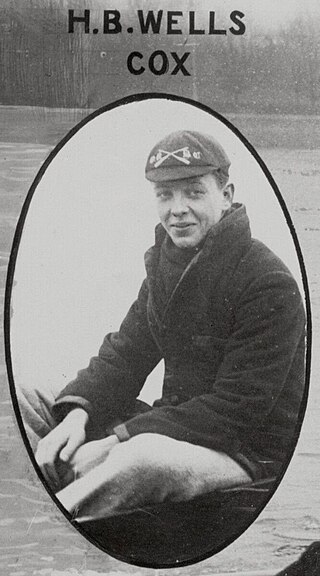
Henry Bensley Wells MBE was an English judge and a rowing coxswain who competed for Great Britain in the 1912 Summer Olympics.
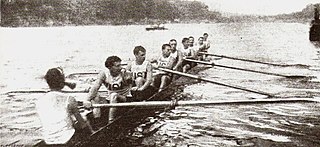
Louis Grenville Abell was an American rower who competed in the 1900 Summer Olympics and in the 1904 Summer Olympics.
Sherman Rockwell Clark was an American rowing coxswain who competed in the 1920 Summer Olympics.
Émile Henri Lachapelle was a Swiss rowing coxswain and sailor who competed in the 1924 Summer Olympics and in the 1948 Summer Olympics.
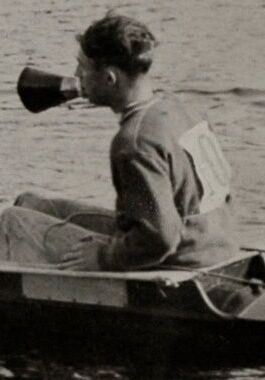
Donald F. "Don" Blessing was an American coxswain who competed in the 1928 Summer Olympics, held in Amsterdam. Blessing was born in Hollister, California and attended Visalia Union High School.
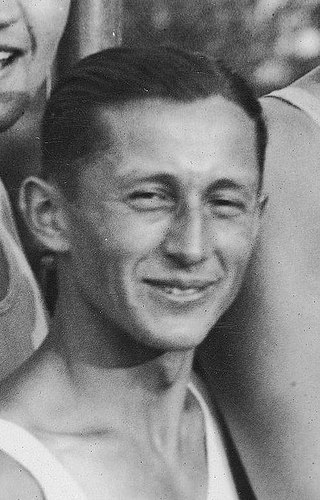
Jerzy Walerian Skolimowski was a Polish rowing coxswain who competed in the 1928 Summer Olympics, in the 1932 Summer Olympics, and in the 1936 Summer Olympics.
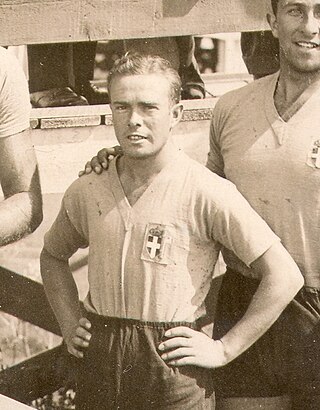
Cesare Milani was an Italian rowing coxswain who competed in the 1928 Summer Olympics, in the 1932 Summer Olympics, and in the 1936 Summer Olympics.
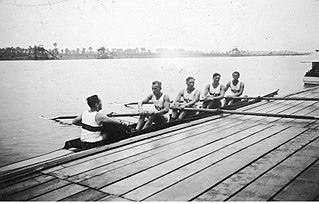
Fritz Bauer was a German coxswain who competed in the 1928 Summer Olympics, in the 1932 Summer Olympics, and in the 1936 Summer Olympics.
Carl-Ebbe Andersen was a Danish coxswain who competed in the 1948 Summer Olympics. He was born in Roskilde. In 1948 he was the coxswain of the Danish boat which won the gold medal in the coxed pair event.

Richard Desborough Burnell was an English rower who won a gold medal at the 1948 Olympics alongside Bert Bushnell in the double sculls. He and his father Charles are the only father and son in Olympic history to have both won gold medals in rowing.

Miroslav Koníček is a Czech rower who competed for Czechoslovakia in the 1960 and 1964 Summer Olympics.
Yuriy Evgenevich Lorentsson was a Russian rowing coxswain. He was the second rower, after Briton Jack Beresford, to compete at five Olympics. In 1960 he was the coxswain of the Soviet boat which was eliminated in the repechage of the eight event. Four years later he finished fifth with the Soviet boat in the eight competition. At the 1968 Games in Mexico City he won the bronze medal as cox of the Soviet boat in the eights event. In 1972 he coxed the Soviet boat which finished fifth in the coxed pair competition. His last Olympic appearance was in Montreal at the 1976 Olympics when he won the silver medal as part of the Soviet boat in the coxed pairs event.
Aleksandr Viktorovich Lukyanov is a Russian coxswain who competed for the Soviet Union in the 1976 Summer Olympics, in the 1980 Summer Olympics, and in the 1988 Summer Olympics and for Russia in the 1996 Summer Olympics and in the 2000 Summer Olympics.
Hryhoriy Mykolayovych Dmytrenko is a Ukrainian former rower who competed for the Soviet Union in the 1980 Summer Olympics and for Ukraine in the 1996 Summer Olympics.
Frank "Mick" Brough was a New Zealand rower who won two medals at the 1930 British Empire Games.

The men's eight competition at the 1948 Summer Olympics took place at Henley-on-Thames, near London. It was held from 5 to 9 August. There were 12 boats from 12 nations, with each nation limited to a single boat in the event. The event was won by the United States, the nation's sixth consecutive and eighth overall gold medal in the men's eight; the Americans had won every time they competed. Great Britain, the only other nation to have won in the event, finished second for its first medal in the event since 1928. Norway took bronze, its first medal in the men's eight since 1920.










